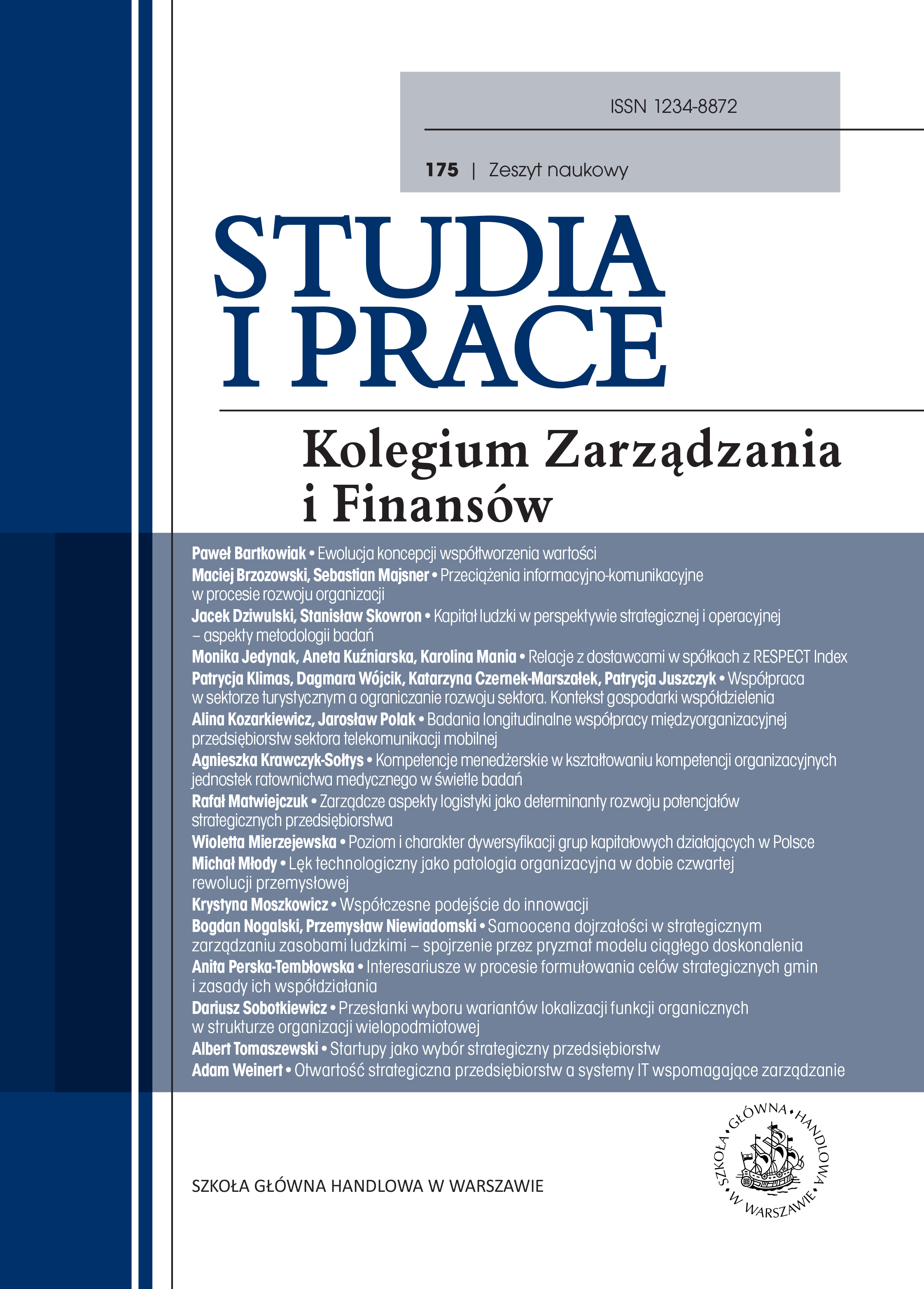Kompetencje menedżerskie w kształtowaniu kompetencji organizacyjnych jednostek ratownictwa medycznego w świetle badań
DOI:
https://doi.org/10.33119/SIP.2019.175.7Słowa kluczowe:
kompetencje organizacyjne, kompetencje menedżerskieAbstrakt
Zakładając, że kompetencje są pojęciem wielowymiarowym i wymagają zintegrowanego podejścia, w przyjętym modelu kompetencji menedżerskich w jednostkach ratownictwa medycznego wyróżniono pięć grup kompetencji ogólnych: przywódcze, komunikacyjne i relacyjne, zawodowe i społeczne, sektorowe oraz biznesowe, a w ich ramach 26 kompetencji szczegółowych.Celem artykułu była identyfikacja obecnego poziomu kompetencji menedżerskich kadry zarządzającej tymi jednostkami oraz ustalenie stopnia, w jakim poszczególne kompetencje menedżerskie oddziałują na kompetencje organizacyjne tych podmiotów w sferach: marketingu (rozpoznawanie potrzeb pacjenta), jakości (poziom świadczonych usług medycznych) i logistyki (świadczenie usług medycznych w odpowiednim miejscu i czasie).W wyniku badań ustalono, że obecnie najwyższym poziomem wśród zaproponowanych w modelu kompetencji menedżerskich charakteryzują się kompetencje biznesowe. Wśród kompetencji menedżerskich w największym stopniu oddziałujących na kompetencje organizacyjne jednostek ratownictwa medycznego znalazły się: w sferze marketingu - kompetencje biznesowe, a w sferach jakości i logistyki - zawodowe i społeczne.
Downloads
Bibliografia
2. Bartczak K. [2015], Logistyka w systemie ratownictwa medycznego w Polsce, „Logistyka”, nr 5.
3. Bartram T., Casimir G., Djurkovic N., Leggat S., Stanton P. [2012], Do Perceived High Perfor¬mance Work Systems Influence the Relationships Between Emotional Labor, Burnout and Inten- tion to Leave? A Study of Australian Nurses, „Journal of Advanced Nursing”, vol. 68, no. 7.
4. Boam R., Sparrow P.R. (red.) [1992], Designing and Achieving Competency. A Competency Based Approach to Developing People and Organizations, McGraw-Hill, London.
5. Bober B., Majchrzak-Lepczyk J. [2015], Rola oraz zadania marketingu w procesie świadczenia usług w szpitalach publicznych, „Handel Wewnętrzny”, nr 5 (358).
6. Boyatzis R.E. [2008], Competencies in the 21st Century, „Journal of Management Develop- ment”, vol. 27, no. 1.
7. Calhoun J.G., Dollett L., Sinioris M.E., Wainio J.A., Butler P.W., Griffith J.R., Warden G.L. [2008], Development of an Interprofessional Competency Model for Healthcare Leadership, „Journal of Healthcare Management”, vol. 53, no. 6.
8. Clark J., Armit K. [2010], Leadership Competency for Doctors: A Framework, „Leadership in Health Services”, vol. 23, no. 2.
9. Davidsson P. [2005], Researching Entrepreneurship, Springer, New York.
10. Dyduch W. [2015], Ilościowe badanie i operacjonalizacja zjawisk w naukach o zarządzaniu, w: Podstawy metodologii w naukach o zarządzaniu, red. W. Czakon, Oficyna a Wolters Klu- wer business, Warszawa.
11. Garman A., Scribner L. [2011], Leading for Quality in Healthcare: Development and Validation of a Competency Model, „Journal of Healthcare Management”, vol. 56, no. 6.
12. Hawass H.H. [2010], Exploring the Determinants of the Reconfiguration Capability: A Dyna- mic Capability Perspective, „European Journal of Innovation Management”, vol. 13(4).
13. Hein S.G., Riegel C.D. [2012], Human Resource and Organizational Management Content in the Hospitality Curriculum: How the Professionals View It, „Journal of Human Resources in Hospitality & Tourism”, vol. 11, no. 2.
14. Huping S., Wenxuan Y. [2013], AssessingChinese Managerial Competenciesfrom Different Per- spectives, „Social Behavior & Personality: An International Journal”, vol. 41, no. 9.
15. International Hospital Federation [2015], Leadership Competencies for Healthcare Services Managers, www.ihf-fih.org, dostęp 20.01.2019.
16. Jena S., Sahoo C.K. [2014], ImprovingManagerial Performance: A Study on Entre-preneurial and Leadership Competencies, „Industrial and Commercial Training”, vol. 46, no. 3.
17. Khadka D.K., Gurung M., Chaulagain N. [2014], Managerial Competencies - a Survey of Hospital Managers’ Working in Kathmandu Valley, Nepal, „Journal of Hospital Administra- tion”, vol. 3, no. 1.
18. Krawczyk-Sołtys A. [2017], From Healthcare Managers Competencies To Healthcare Organi- zations Competences, „VADYBA Journal of Management”, no. 31(2).
19. Krawczyk-Sołtys A. [2018a], Modelowanie kompetencji w jednostkach ratownictwa medycz¬nego - założenia wstępne, w: Nauki o zarządzaniu w odmiennych kontekstach badawczych, red. M. Tutko, M. Wronka-Pośpiech, Wydawnictwo Uniwersytetu Jagiellońskiego, Kraków.
20. Krawczyk-Sołtys A. [2018b], Personal Competencies Enhancing Organizational Competences of Emergency Medical Units in Poland - Empirical Research, Conference Proceedings of the 2nd International Scientific Conference Development and Administration of Border Areas of the Czech Republic and Poland Support for Sustainable Development, red. E. Ardielli, Ostrava.
21. Kupczyk T., Stor M. [2017], Zarządzanie kompetencjami. Teoria, badania i praktyka bizne¬sowa, https://www.vistula.edu.pl, dostęp 20.01.2019.
22. Lakshminarayanan S., Pai Y., Ramaprasad B.S. [2016], Competency Need Assessment: A Gap Analytic Approach, „Industrial & Commercial Training”, vol. 48, no. 8.
23. Lavie D. [2006], Capability Reconfiguration: An Analysis of Incumbent Responses to Technolo- gical Change, „Academy of Management Review”, vol. 31(1).
24. Leggat S.G., Balding C., Anderson J.A. [2011], EmpoweringHealth-care Managers in Austra¬lia: An Action Learning Approach, „Health Services Management Research”, vol. 24, no. 4.
25. Liang Z., Howard P.F., Leggat S., Bartram T. [2018], Development and Validation of Health Service Management Competencies, „Journal of Health Organization and Management”, vol. 32, iss. 2.
26. Lisiecka-Biełanowicz M. [2016], Zarządzanie jakością relacji w organizacjach ochrony zdro¬wia, Difin, Warszawa.
27. Lustri D., Miura I., Takahashi S. [2007], Knowledge Management Model: Practical Application for Competency Development, „The Learning Organization”, vol. 14(2).
28. Maijanen P., Jantunen A. [2016], The Dynamics of Dynamic Capabilities - The Case of Public Broadcasting, „International Journal Business Excellence”, vol. 9(2).
29. National Center for Healthcare Leadership (NCHL) [2005], Healthcare Leadership Compe¬tency Model, Summary, www.nchl.org, dostęp 20.01.2019.
30. Pomoc doraźna i ratownictwo medyczne [2018], Główny Urząd Statystyczny, Warszawa, https:// stat.gov.pl, dostęp 20.01.2019.
31. Ritchie D., Yen M. [2013], Health Services Management Development: What Formal Knowledge Should Support the Skills and Experience Required?, „Australian Health Review”, vol. 37, no. 2.
32. Ross A., Wenzel EJ., Mitlyng J.W. [2002], Leadership for the Future: Core Competencies in Heal¬thcare, HAP, Chicago.
33. Stefl M.E. [2003], Report of the Competency Task Force: Healthcare Leadership Alliance, HLA, Chicago.
34. Stefl M.E. [2008], Common Competencies for All Healthcare Managers: The Healthcare Leader¬ship Alliance Model, „Journal of Healthcare Management”, no 53(6).
35. Wickramasinghe V., De Zoyza N. [2011], Managerial Competency Requirements thatEnhance Organizational Competences: A Study of a Sri Lanka Telecom Organization, „The International Journal of Human Resource Management”, vol. 22(14).
36. Yang B.C., Wu B.E., Shu P.G., Yang M.H. [2006], On Establishing the Core Competency Identi- fying Model: A Value-Activity and Process Oriented Approach, „Industrial Management & Data Systems”, vol. 106(1).









